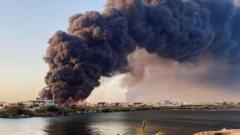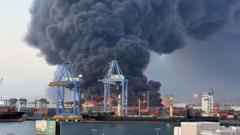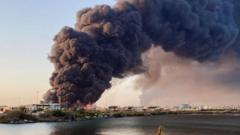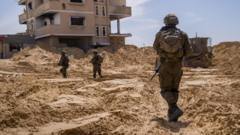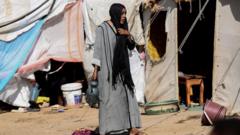The recent escalation of violence in Port Sudan has left the city in chaos, as residents struggle with skyrocketing water costs and power outages following drone strikes. Many families are unsure of their future as the humanitarian situation worsens.
Port Sudan Faces Dire Crisis Amid Renewed Violence

Port Sudan Faces Dire Crisis Amid Renewed Violence
After a week of relentless attacks, Port Sudan grapples with soaring water prices, blackouts, and a humanitarian disaster.
Port Sudan, once a relative refuge from Sudan's civil war, is now in turmoil following a week of brutal aerial assaults by the Rapid Support Forces (RSF). The attacks have severely impacted access to essential resources, most notably water, which has seen a dramatic price surge. The ongoing bombardments have caused significant damage to three fuel depots, leading to dangerous fires and crippling the city's ability to pump groundwater.
The conflict in Sudan, which ignited over two years ago between RSF leaders and the army, has escalated into one of the planet’s ugliest humanitarian crises, displacing over 12 million people. Among those affected is 26-year-old Mutasim, who shared his harrowing experience of waiting hours for a water vendor, reflecting on how the price for a daily supply of water increased fivefold in just a week.
Although life within Port Sudan had begun to normalize before the recent violence, residents now find themselves facing extraordinary challenges. Access to petrol is severely restricted; Mutasim expressed frustration at waiting five hours just to refuel his vehicle. Even before these events, Port Sudan was a costly haven, as many displaced families had exhausted their savings while fleeing violence elsewhere.
In particularly dire straits is Hawa Mustafa, a teacher from Darfur, who has been living in a shelter with her four children. The drone attacks have forced her back into a constant state of fear, recalling her traumatic experiences from earlier conflicts. Facing looming uncertainties regarding her family's safety and the impossibility of seeking refuge in neighboring countries, her plight encapsulates the deepening crisis.
Humanitarian organizations have relied heavily on Port Sudan as a distribution point for vital aid. However, as violence continues, the flow of food and medical supplies into the region faces significant threats, prompting worrying forecasts regarding famine across Sudan. Aid agencies report that many regions are already experiencing severe food shortages, and the latest attacks threaten to exacerbate the already critical situation.
Meanwhile, the streets of Port Sudan have become eerily quiet at night, with residents opting to stay indoors to avoid danger. Only days prior, the city buzzed with life as people gathered by the coast to socialize. Now, with scheduled power outages compounding residents' fears, life has transformed drastically, leaving many to ponder their uncertain fate as the conflict rages on.





